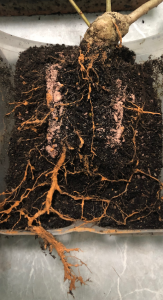SOIL DEGRADABLE SEEDLING POTS – PACT RENEWABLES’ ALTERNATIVE TO PLASTIC POTS FOR REDUCING LANDFILLING
Advantageously, these super functional seedling pots solve the inherent problems with plastic pots: excess watering, nutrient runoff and transplanting needs.
SYDNEY, NEW SOUTH WALES, AUSTRALIA, January 14, 2022 /EINPresswire.com/ -- As the pressure is on to reduce landfilling, a crucial step in cutting emissions that contribute to global climate change, there is an urgent need to sustainably and cost-effectively deal with the disposal of plastic and polymer-based wastes. One major and untold contributing factor to this challenge is horticultural containers, particularly plastic seedling pots, which despite their advantages of high flexibility and shapeability, suffer from some inherent disadvantages, such as excess watering requirements, nutrient runoff, and the need for transferring grown seedlings into the soil. The key disadvantage with plastic seedling pots is their high cost of recycling due to soil contaminants and added pesticides, but most importantly the limited market demand for recycled material as a feedstock for new products, thus leaving no option for disposal other than landfilling.
Whilst the magnitude and urgency of the challenges associated with the disposal of plastic pots is acknowledged by the horticultural industry, the fact remains that, until now, no alternative sustainable technology has been available for the manufacture of plastic-free seedling pots with comparable functionalities to that of their plastic counterparts. Additionally, in the face of evolving environmental guidelines, the absence of full life cycle assessments for currently proposed non-plastic seedling pots has evidently contributed to the slow uptake of such new technologies.
Dr Arakel, the director and chief technologist of Pact Renewables said, “Despite all global efforts to reduce landfilling to achieve zero waste and fulfill net zero ambitions, plastic and polymer-based products remain entrenched in the manufacture of numerous industrial products and consumer goods, because of their ease of manufacture and functionality. This will remain the case unless alternative viable and sustainable technologies are developed. It is encouraging to see the packaging industry, particularly the food and beverage sector, making major strides in replacing non-disposable plastics. However, it is limited to only this specific industry, and is largely driven by the global push to ban the use of single-use plastics.
As an indication of the size of the plastics challenge facing the horticultural container industry, approximately 2 billion plastic horticultural containers were used globally in 2020, the bulk of which were disposed of in landfills or incinerated."
Dr Arakel added, “We saw this complex challenge as an opportunity, and similar to our previous technology development efforts, we undertook the development of a technology-based solution with the premise of addressing the key product requirements, namely product functionality and confirmation of markets as prerequisites for technology readiness for commercial deployment. The product development efforts have taken over five years and culminated in a breakthrough technology for the manufacture of sustainable, mineral-based seedling pots. This has been achieved through a rigorous systematic performance evaluation of several product prototypes, before finalising the micro-engineering design packages for each market segment. Our technology platform for manufacturing the seedling pots for targeted horticultural market sectors is now confirmed for application at scale, for which all components of the life cycle cost of our seedling pot products are fully accounted for.
Based on our conclusive results, I am pleased to confirm that compared to their plastic counterparts, the seedling pots made from our composite technologies offer unique features. These include lowering watering requirements by optimising water holding capacity, which also substantially reduces nutrient runoff. More importantly, due to their degradability in soil, there is no need for plant transplantation or landfilling of used seedling pots. Degradation in soil is clearly demonstrable (inset) via a combination of physical disturbance, chemical degradation of minerals and biological processes dominated by root penetration through the walls and base of the pots.
We believe that seedling pots produced from cheap and plentiful mineral-based feedstock materials, using our sustainable technology are applicable to multiple markets - an inherent key challenge inherent in driving investment decisions in new products. A sustainable technology for manufacturing seedling pots with wide ranging applications, because no binders or homogenisers are added, the pots take form and harden fast, using conventional moulding machinery and no production waste is generated. These collectively translate to a low cost, low footprint manufacturing operation. Seedling pot markets that we have identified and confirmed, so far, include food production, reforestation, mine site rehabilitation, various retail markets, whilst also assisting farmers with carbon footprint reduction in their regenerative farming efforts."
Dr Arakel went on to conclude, “With the completion of our technology development and evaluations, identification and validation of markets for targeted downstream products, and our progressive patent filings, we are offering our technology platform to industry and other interested parties through advisory services, technology licensing, contract R&D, and any other mutually acceptable arrangements. Selected product lines are also shortly being introduced to Australian markets."
About Pact Renewables
Pact Renewables is a private technology development company and owner of a portfolio of sustainable technologies for waste reduction and product recovery from various waste streams, with measurable impactful outcomes. The Company draws from the skills of highly qualified personnel, including scientists, engineers, and ecologists, along with Dr. Aharon Arakel, the lead technology developer and a recognised world expert in the field of product recovery from saline waste streams. In addition to holding a unique technology portfolio and unique expertise, the Company operates specialised in-house material testing and field demonstration facilities to cater for the needs of industries seeking integrated services for addressing waste challenges, improving their value chain, and achieving their sustainability objectives.
Aharon Arakel
Pact Renewables Pty Ltd
+61 2 9484 4274
info@pactrenewables.com

